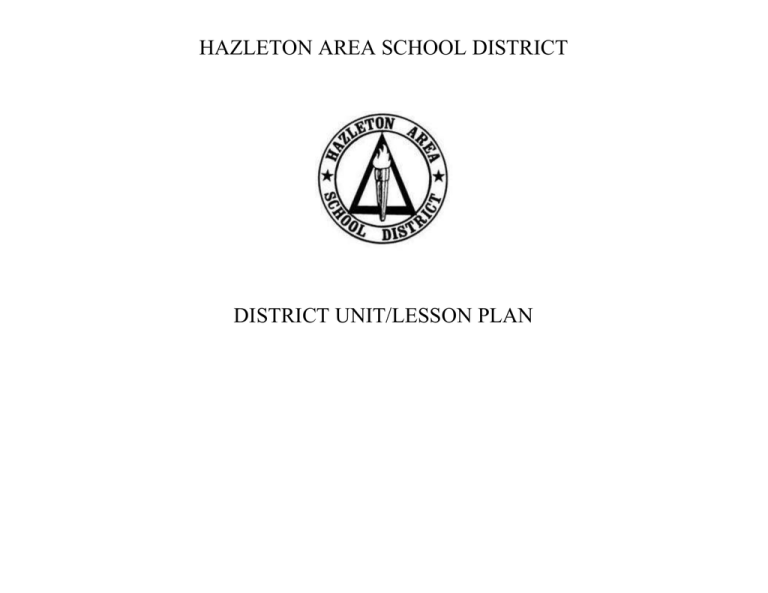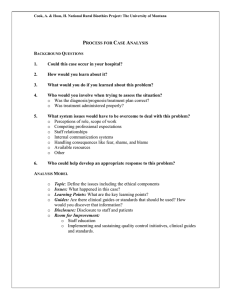HAZLETON AREA SCHOOL DISTRICT DISTRICT UNIT/LESSON PLAN
advertisement

HAZLETON AREA SCHOOL DISTRICT DISTRICT UNIT/LESSON PLAN Teacher Name : SIST,Nadine Subject : Law Enforcement/Emergency Services Start Date(s): 09/27/14 Building : HACC, Room C05 Grade Level (s): III End Date: 10/6/2014 Unit Plan Unit Title: Law Enforcement/ Emergency Services/ Crime Scene Management Essential Questions: Explain how your crime scene investigation should accurately portray the physical facts, how do you sketch? Conduct a preliminary investigation on a crime scene-where do you physically begin-how do you mark evidence? Cite specific evidence on how your crime scene investigation differs with each crime. Interpret what a rough sketch means and its importance-why do you want to keep it for yourself? Differentiate between collaborative investigating and individual investigating-why is it easier to have a team? Demonstrate how to use ruler. Explain why you need to know different sketch techniques. Standards: CC.3.5.11-12.A. cite specific textual evidence, ect CC.3.5.9-11-12B. Determine central ideas or conclusions of a text; ect. CC.3.6.11-12.C. Produce clear and coherent writing; ect CC.3.6.9-11-12.D Develop and strengthen writing as needed. CC.3.6.11-12.E Use technology, including text; ect CC 3.6.11-12.B Write informative or explanatory texts, including narration of technical processes; ect Competency and Task List: Task 700- court systems. Explain the role of the court systems and components of the criminal justice system Summative Unit Assessment : Unit exams, written evaluations, demonstrations, Passing score on NOCTI exam Summative Assessment Objective Students willcomplete writing assignments –as per keystone standards participate in discussion and lecture complete learning guides and review guides Participate in on line learning and research Assessment Method (check one) ____ Rubric __X_ Checklist _X___ Unit Test ____ Group __X__ Student Self-Assessment _X___ Student learning guide ____Performance Assessment __X__ Written assessment ____ Other (explain) __X__Teacher question assessment Day Objective (s) DOK LEVEL Activities / Teaching Strategies Grouping DAILY PLAN Materials / Resources Assessment of Objective (s) 1 2 3 4 5 6 Describe and demonstrate how crime scene investigation should accurately portray the physical facts. Extension from first sketches. 1 2 3 Students will participate in lecture, discussion, and research crimes to investigate in group setting. Students will review and read chapter two in criminal investigation book and recall important objectives. Answer essential question in PDN section of notebook. W I Teacher made student materials, Guided worksheets, learning guides, lap tops, smart board, text books Formative-Student engagement with questions and discussion Summative- completing student unit 0f orientation and completing learning guides. Unit test Student Self - Assessment-learning guides Summarize and compare important points on why and where do you physically begin your criminal investigation? 1 Investigate how meaning of vocabulary words can be altered by changing endings and how you would use words in writing proper sentences. Chapter two. Probe each idea in informational text. Answer essential question in PDN section of notebook. W S I Teacher made student materials, Guided worksheets, learning guides, lap tops, smart board, text books Crime scene investigation can create a mental picture for those not present, it can help you keep refresh your memory during your investigation process. 1 2 3 Students will read and review chapter one in criminal investigation book and identify key points from reading content. Research crime from newspaper and recreate the crime scene in small groups. Answer essential question in PDN section of notebook. W S I Teacher made student materials, Guided worksheets, learning guides, lap tops, smart board, text books Make observations from mock crime scene to compare individual student work. Work in teams to complete sketches, individual work – students compare work. 1 2 3 Students will compare work; Begin mock crime scene. Continue chapter two in criminal investigation book and recall important objectives. Chapter one quiz Answer essential question in PDN section of notebook. W S I Teacher made student materials, Guided worksheets, learning guides, lap tops, smart board, text books Formulate ideas on how to approach and respond to crime researched by students. Students assist team mates on identifying evidence and practice not to disturb evidence. 1 2 3 Continue crime scene sketching. Answer essential question in PDN section of notebook. W S I Teacher made student materials, Guided worksheets, learning guides, lap tops, smart board, text books Make a connection with mock crime from class and then what would be done in follow up investigation. 1 2 3 Complete crime scene sketches 1-3 rough drafts and completed sketches Answer essential question in PDN section of notebook. W S I Teacher made student materials, Guided worksheets, learning guides, lap tops, smart board, text books Formative-student engagement with questions and discussion. Summative- completing student unit and learning guides, unit test Student Self - Assessment-learning guides Formative- Student engagement with questions and discussion Summative- completing student unit 0f orientation and completing learning guides. Unit test Student Self - Assessment-learning guides Formative- Student engagement with questions and discussion Summative- Student engagement with questions and discussion Summative- completing student unit 0f orientation and completing learning guides. Unit test Student Self - Assessment-learning guides Formative- Student engagement with questions and discussion Summative- Student engagement with questions and discussion Summative- completing student unit 0f orientation and completing learning guides. Unit test Student Self - Assessment-learning guides Formative- Student engagement with questions and discussion Summative- Student engagement with questions and discussion Summative- completing student unit 0f orientation and completing learning guides. Unit test Student Self - Assessment-learning guides 3

